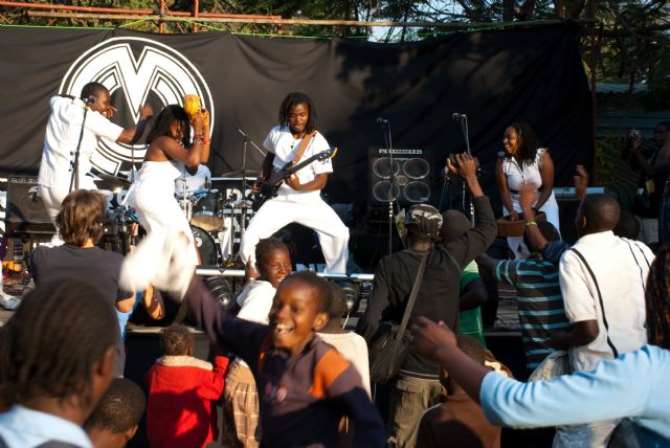MUSIC CROSSROADS TARGETS WEST AFRICA EXPANSION
AFTER steam-rolling in Malawi, Mozambique, Tanzania, Zambia and Zimbabwe, where its series of festivals have transformed many-a-lives of previously unknown and uncompetitive youth music groups, it is now the turn of West Africa to savor the fruits of one of the world's foremost philanthropic artistic interventions.
Music Crossroads (MC) is a series of music festivals involving youths, and availing opportunities in music making, performances, management and health issues. It also welcomes South Africa next year, enlarging a campaign that began in Tanzania in 1996.
A feasibility study seeking ways to expand the programme in West Africa began in the region last year and will end soon.
Director Dag Franzen, recently revealed from his base in Spain: “It is not just to add countries to the list but also about carefully discerning how Music Crossroads could concretely assist and support young musicians and, in the long term, the music industry in a given country. We first assess each potential partner's overall objectives, values and organizational capacity and define how necessary resources may be deployed,” he stated.
As a teaser to West Africa's entry into the Music Crossroads family, a music group from Ghana will perform as special guest acts at this year's edition in Tanzania where the next InterRegional Festival (IRF) is scheduled between the 15th and 18th July 2010 in Dar es Salaam, Tanzania.
Dag stated that after 15 years of building successful track records in Zimbabwe (1996), Mozambique (1997), Malawi (1999), Tanzania (2000) and Zambia (2003), it is time to use the gained experiences and expand the program to more countries in Africa. South Africa is part of a continent wide onslaught that will see more countries on the continent attain membership to the youth-music festival concept.
He declared: “Step by step, we will start to connect the African continent through a youth music network of existing rich and diverse cultural traditions and contemporary scenes combined with a thrust on music education with a vision to one day see young African artists and bands appear in the mainstream global music market, not only as world music acts. But it's a long road to get there and the MC expansion will be organic - as we need to ensure that there is available funding and sincere will on national levels to do so.”
In southern Africa MC have come a long way in creating opportunities and tools for young musicians in the present 5 target countries and Dag believes “there is still some more road to cover before we can truly say that we ultimately 'empower' young people through music.
The programme's ability to tap into un-sampled yet marketable raw music from all genres and among the youths had hitherto been unheard of and is considered a novelty for the continent.
In the five implementing partner countries, new hope is being instilled into previously disillusioned youths, making them overnight success stories at music making and performance.
Zimbabwe's Bongo Love, are now the talk of the US since they blazed through the festivals in 2006. Compatriots and paraplegic band Liyana, (its raining in isiNdebele) has had whirlwind tours in the same country, a milestone from their maiden and award-winning package stint in Europe in 2007. A documentary of the band's leading lady Prudence Mabhena won an Oscar recently. Harare-based Gwarimba toured Sweden and Austria in 2009, while outstanding Mokoomba from Vic Falls made a European tour in late 2009 – with such a success that the band will return for another tour in 2010.
Malawi's Tikhu Vibrations, winners in 2003, had their debut international tour the same year to Sweden, UK and Norway, followed by IRF winners 'Konga Vibes' in 2006-07 and the exceptional Body, Mind & Soul 2007-2008
Mozambique's Kapa Dech, Banda Azul, Timbila Muzimba, Nfithe and Nyasha complete a contingent of musical outfits that have successfully performed across Europe.
Tanzanian Oya Theatre won the IRF in 2004 with a European tour the following year and Afrikali repeated the feat in 2005-06.
Zambia's Sunga Umukoshi, an eight piece band who took second place at the 2007 IRF in Harare, recently returned from their winners' tour - a three weeks tour of Sweden. IRF winners 2009, Nyali from Lusaka, will tour Europe from end of May until early August 2010.
After it's tried and tested run in the five SADC countries, now the MC believe they have “a strong, standardized concept and structure with common objectives and values which could easily be adapted in other countries and world regions.”
Meanwhile, MC is consolidating its position in the operational southern African countries, where they are currently seeking 5 researchers to map the national music education sectors as part of the Music Education in Southern Africa (MESA) project, funded predominantly by Barcelona Solidaria, of Spain.
The research assignment will conclude this year and Dag said a new curriculum will then be developed for use in training music teachers of each implementing country in the next year.
Dag said that considering the SADC experiences and the West Africa initiative, it won't be long before we see regional Music Crossroads festivals leading up to an annual or bi-annual Pan-African Music Crossroads Festival.
He added: “We have come to realize the importance of developing relevant and effective national music education structures. In the five Southern African countries where Music Crossroads is present - with a total population of some 100 million people - the local music industry is struggling. There are few record companies, distributors and professional artist managers; high levels of piracy and an immense "brain drain" with artists leaving countries to pursue markets and audiences elsewhere.”
Martin Chemhere is a Freelance African Arts and Media Consultant. He writes this article from Johannesburg.

